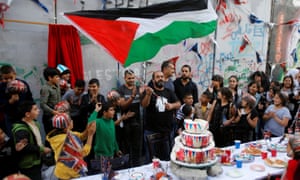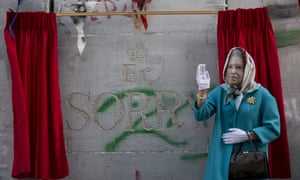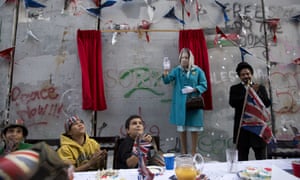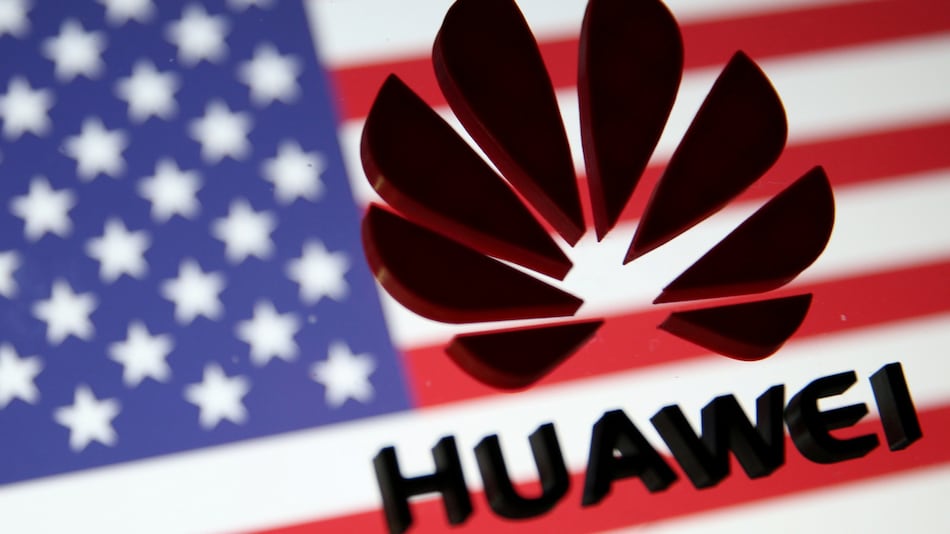
Protesters have crashed a tongue-in-cheek “street party” organised by the artist Banksy outside his Walled Off hotel in the West Bank city of Bethlehem to mark the 100th anniversary of the Balfour declaration, which promised a national Jewish homeland in Palestine.
People from the nearby Aida refugee camp said afterwards they objected to the way the event had “used” Palestinian children as the centrepiece of the performance. “We came because we didn’t like the use of the British flags or the way they were using Palestinian children,” said Munther Amira, a prominent activist from Aida who planted a large Palestinian flag in the middle of a cake.
The intervention came amid heightened sensitivities over the centenary of the Balfour declaration, which will be marked on Thursday with a formal dinner in London.

Palestinians, not least in Bethlehem, have been divided over Banksy’s hotel. While many are grateful that it has attracted foreign visitors to learn about the occupation, others have been uncomfortable that it has eclipsed local Palestinian voices while garnering publicity for the Bristol-based street artist.
Organisers of Wednesday’s event have been contacted for comment.
Banky’s rendering of a British street party was intended to satirise other celebrations, including the dinner on Thursday, at which guests will include the British prime minister, Theresa May, and her Israeli counterpart, Benjamin Netanyahu.
Several dozen Palestinian children had been invited to the event, which included scorched bunting and flags, cakes and helmets painted with union flags set at a table beneath the looming concrete separation wall.
The event also included the unveiling of a new work by Banksy, etched into the concrete of the wall: a mock apology from Queen Elizabeth II to the Palestinians reading “Er… sorry”.
The Balfour declaration was the result of discussions between British Zionist leaders seeking political recognition of their goals for Jewish statehood and British politicians embroiled in the first world war.
The declaration, which promised British assistance to create a Jewish homeland, served as the basis for the British Mandate of Palestine, which was approved in 1920 by the League of Nations, a precursor to the UN.
A statement by Banksy read out at the event underlined that it was not intended to be a celebration. “This conflict has brought so much suffering to people on all sides – it didn’t feel appropriate to ‘celebrate’ the British role,” he said.
“The British didn’t handle things well here. When you organise a wedding,” the statement said, referring to the promise of a Jewish national homeland in Palestine, “it’s best to make sure the bride isn’t already married.”

The event came as Israelis and Palestinians began marking the issuing of the declaration on 2 November 1917 in starkly different ways. Netanyahu’s visit to London on Thursday will be followed next week by a special session of the Israeli parliament to celebrate the founding diplomatic document of Israeli nationhood.
Palestinians are marking the centenary with demands for a British apology. “We asked them to make it right, to make this historical oppression right by recognising the state of Palestine and apologising to the Palestinian people,” the foreign minister, Riyad al-Malki, said.
Roderick Balfour, a descendant of Lord Balfour, who wrote the original document, has argued that the continuing lack of a Palestinian state would not have pleased his famous ancestor.
“I’m sure Arthur would say, ‘This is unacceptable’, that there’s got to be more help for the Palestinians,” he told the news agency AFP. “Israel has got all these people living in their midst – probably it’s time that they took stock of that and helped.”
Jonathan Schneer, a historian who wrote a book on the document, said: “It’s so divisive even today because Zionists think that the Balfour declaration laid the foundation stone for modern Israel. They’re right to think that. By the same token, non-Jewish Palestinians and Arabs see it as the foundation stone of their dispossession and misery.
“Everything stems from the Balfour declaration.”
Source:-theguardian



